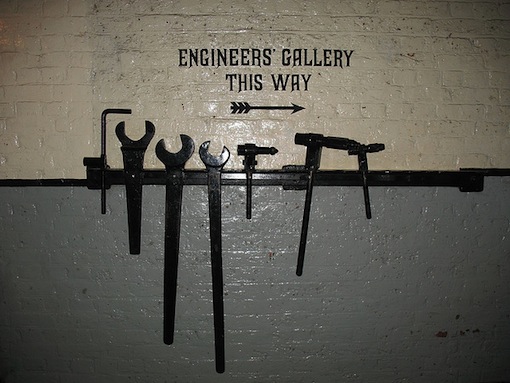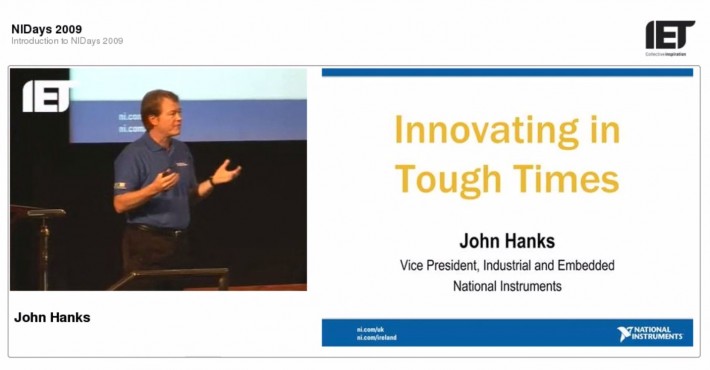One of the main sources of copyright-cleared moving images, still images and sound for use in UK Further and Higher Education is set to include a major collection of engineering videos. Rick Loup welcomes IET.tv into JISC MediaHub.
 About the Author: Rick Loup is Multimedia Services Development Officer at EDINA, the Jisc-designated centre of expertise and centre for online services and part of 'EDINA and Data Library' division of Information Services at the University of Edinburgh. He co-ordinates, develops and supports delivery of existing and new multimedia services and monitors wider UK initiatives to determine service opportunities for EDINA
E-mail: richard.loup@ED.AC.UK
Tel: 0131 651 1319
About the Author: Rick Loup is Multimedia Services Development Officer at EDINA, the Jisc-designated centre of expertise and centre for online services and part of 'EDINA and Data Library' division of Information Services at the University of Edinburgh. He co-ordinates, develops and supports delivery of existing and new multimedia services and monitors wider UK initiatives to determine service opportunities for EDINA
E-mail: richard.loup@ED.AC.UK
Tel: 0131 651 1319
Many of the newsreels cross-link to the BUFVC’s News on Screen
This autumn a major scientific video collection becomes available online to UK Further and Higher Education as part of JISC MediaHub (http://jiscmediahub.ac.uk), one of the primary sources of multimedia content for free use in UK Further and Higher Education. The IET.tv archive (The Institute of Engineering and Technology) is one of the largest sources of multimedia content in the field of engineering and technology. It contains video programmes from practising engineers, technologists and key industry speakers, including prestigious lectures and presentations from major IET and other organisations’ events, and interviews with experts from industry and academia. In total, there are over 3,000 videos, each between twenty and forty-five minutes long, covering important subjects and filmed between 2002 and 2012.
The IET.tv collection is licensed by JISC Collections. Lorraine Estelle, head of content at Jisc, says:
'This engineering collection is a great complement to other moving-image content that JISC Collections has licensed for the UK academic community, much of which so far has been broadly in the arts and humanities area. I’d also like to emphasise that the collection is free to members of FE institutions that subscribe to JISC MediaHub, Jisc’s major multimedia platform, hosted by EDINA, a key Jisc partner service. Making JISC MediaHub free to UK Further Education is part of Jisc’s renewed commitment to the sector.'
BUFVC members may not be that familiar with JISC MediaHub, which has been in service since 2011, but they are likely to be familiar with its content. Over a dozen of its collections were licensed for Jisc via the BUFVC in 2002 and became Film & Sound Online (FSOL) in 2003. The rolling programme of selection, licensing, digitisation and cataloguing behind the service was managed by the Managing Agent and Advisory service (MAAS), a special team of staff from the BUFVC and the Open University. The FSOL service itself was designed, developed and hosted by EDINA, the Jisc-funded national datacentre that hosts JISC MediaHub.
The wide-ranging selection of collections from FSOL includes world-famous Imperial War Museum footage, such as The Battle of the Somme, rare 1970s interviews with important 20th-century philosophers at Oxford in 'Logic Lane', the Films of Scotland, the gritty, north-east Amber Films documentaries and scientific content from the Wellcome Library and the Biochemical Society.
There is also over fifty hours of classical music recording from the Culverhouse collection, which, unusually, permits manipulation and editing of the audio files, making the collection of great practical use in teaching and learning.
Newsfilm is another major part of JISC MediaHub, which includes the 3,000 hours (some 60,000 stories) of ITN footage from 16 separate collections that were selected, digitised and catalogued by the BUFVC in the Jisc-funded Newsfilm Online (NFO) project with ITN that became the service of the same name at EDINA in 2008.
In addition to independent TV news footage from the birth of television through to recent stories from Channels Four and Five, the sources include the complete Gaumont and Paramount cinema newsreels, from 1910 and 1934 respectively. To assist researchers, many of the titles in these newsreels cross-link to related records in the BUFVC’s News on Screen service and vice versa.
Previously unbroadcast and unseen material, such as rushes and programme scripts, are also included.

In his final report on the NFO project, Murray Weston, the BUFVC director at the time, noted:
'NFO was developed to extend the online delivery and use of moving image content in UK Higher and Further Education. [It was] a creative partnership between the broadcasting industry and the education sector to release previously inaccessible content to millions of users. The project was founded on the BUFVC’s long-standing collaboration with ITN/Reuters Television in the collection and dissemination of newsreel data through the British Universities Newsreel Database [now News on Screen]. The advantage for the Higher and Further Education communities was to gain access to primary source historical content which would be of long-term value across many academic disciplines. Researchers could use newsfilm as source material, as supplementary material, and as an indicator of popular interests and attitudes. Learners might also simply want to cut it up for their own purposes. Newsfilm might be embedded as learning objects in Virtual Learning Environments. Many users welcome the opportunity to view material in its raw state but others, notably in FE, are pleased to see content packaged in a form that complements curriculum objectives. The selection of 3,000 hours of content from 130,000 hours of newsfilm material held in the ITN Archive was a challenge. The aim of NFO selection was to reflect user needs across the HE/FE sector and the range of materials held. This model was also varied by strategic moves to accommodate pragmatic issues such as third-party copyright ownership and source format or condition. Further refinement in the plan was guided by more user needs identified in consultation with the HE/FE sector and user feedback. Choices were predominantly subject-driven, with a conscious endeavour to broaden the scope of content selected to engage a wide range of academic disciplines.'

(image: cc attribution: Capitu)
JISC Digital Media echoes the importance of newsfilm in education in a case study by Tim O’Riordan, Using Newsfilm on JISC MediaHub:
'The thousands of news stories and historical events interpreted in the collection provides an abundance of visual reference material of value to anyone studying or researching history, the media, arts, language, literature as well as many other subject areas,' he writes. A further eleven collections were licensed for inclusion in JISC MediaHub in another significant procurement during 2009-10. Over 56,000 images and 600 hours of film were selected by the education community to capture world, UK and local events during the last 25 years. Sources include the AP Archive, Getty Images, (more) ITN, Design Council Archives, Imperial War Museum, Royal Geographical Society, and PYMCA. The three film collections are ITN, AP and Getty; the other eight are all still images, some of which, such as the Imperial War Museum collection, are an obvious complement to the existing film collection in JISC MediaHub.
One of JISC MediaHub’s really distinctive features is that, in addition to all this subscription content, most of it not otherwise available elsewhere on the web, it also enables users to search and link out, as a free-to-Web discovery portal, to nearly a million items in selected external media collections such as the Open Video Project, Wellcome Images, Archaeology Data Service, ARKive and the First World War Poetry Archive, all selected for their educational significance.
JISC MediaHub is part of JISC eCollections, a community-owned content service providing UK higher and further education with access to world-class collections of historical books, journal archives and multimedia content. Looking to the future, Lorraine Estelle adds:
'Jisc has trusted experts in copyright, resource discovery, accessibility and all aspects of the use of digital media in education. This expertise is unique and will enable us to grow Jisc MediaHub as a very significant non-commercial provider of multi-media content, able to enhance and extend the range of digital materials available to HE and FE in ways that the commercial providers cannot.'
Rick Loup
JISC MediaHub: http://jiscmediahub.ac.uk
JISC eCollections: http://www.jiscecollections.ac.uk/
Jisc: http://www.jisc.ac.uk/
EDINA: http://edina.ac.uk/
News on Screen: http://bufvc.ac.uk/newsonscreen
Case Study: Using Newsfilm on JISC MediaHub: http://www.jiscdigitalmedia.ac.uk/casestudy/using-newsfilm
